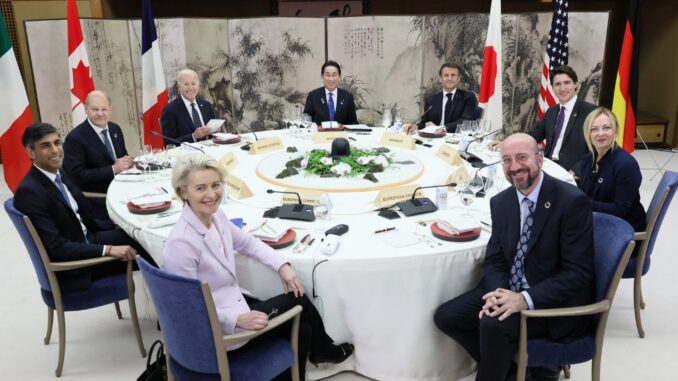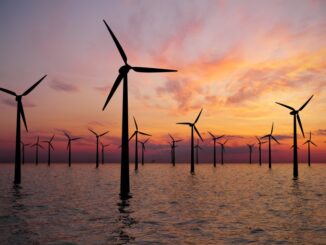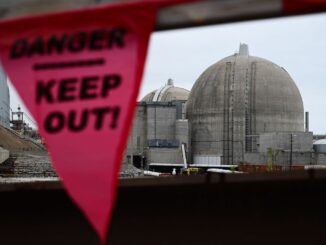
Leaders of the Group of Seven (G7) countries have pledged to tighten sanctions aimed at punishing Russia for its invasion of Ukraine, intensifying what is already one of the harshest sanctions efforts ever implemented.
The move came on the first day of the three-day G7 summit in Japan and marked the latest sanctions and export controls targeting Moscow, which have hit thousands of targets and imposed steep curbs on Russia over its invasion of Ukraine last year.
“Our support for Ukraine will not waver,” the G7 leaders said in a statement released after closed-door meetings on Friday. They pledged “to stand together against Russia’s illegal, unjustifiable and unprovoked war of aggression against Ukraine”.
“Russia started this war and can end this war,” they said.
A statement issued by G7 leaders said restrictions would cover exports of industrial machinery, tools and technology useful to Russia’s war effort, while efforts would be pursued to limit Russian revenues from trade in metals and diamonds.
Separately, US Treasury Secretary Janet Yellen said a raft of new US actions “will further tighten the vise on [Russian President Vladimir] Putin’s ability to wage his barbaric invasion and will advance our global efforts to cut off Russian attempts to evade sanctions.”
The actions targeted Russia’s sanctions evasion, future energy revenues and military-industrial supply chains, with sanctions imposed on more than 300 targets on Friday.
The Treasury said it imposed sanctions on 22 people and 104 entities with touchpoints in more than 20 countries in jurisdictions, while the Department of State targeted almost 200 people, entities, vessels and aircraft.
US sanctions authorities were also expanded to more sectors of the Russian economy, including architecture, manufacturing and construction, the Treasury said, allowing any person or entity operating in those sectors to be hit with sanctions.
The Biden administration also halted the export of wide range of consumer goods to Russia on Friday and added 71 companies to the Department of Commerce’s “Entity List,” which bars suppliers from selling them US technology without a hard-to-obtain licence.
The new curbs targeted items that can be used to help Russia’s military, including items used in daily life like clothes dryers, snowploughs and milking machines which the US thinks could be repurposed to support Moscow’s war machine.
“You can’t even ship contact lenses or sunglasses now,” said Washington lawyer Kevin Wolf, a former Commerce official, as he reviewed the new rules. Wolf said that “it would be simpler to describe the items that are not controlled for export to Russia”.
The blacklisted companies include 69 Russian entities, one from Armenia and one from Kyrgyzstan.
The targeted companies include aircraft repair and parts production plants, gunpowder, tractor and car factories, shipyards and engineering centres in Russia.
The US and Europe imposed financial penalties on Russia immediately following the start of the war and have steadily ratcheted up the pressure since then, targeting Russia’s Putin and officials close to him, the financial sector and oligarchs.
Experts have said Washington could still impose tougher penalties, however – while the sanctions have clearly damaged Russia’s economy, they have not stopped Putin from pursuing a war that has killed thousands and turned cities to rubble.
US President Joe Biden informed G7 leaders at their summit in Japan that Washington will support a joint effort with allies to train Ukrainian pilots on F-16 fighter jets, The Associated Press and CNN reported on Friday, citing sources.
Ukraine is seeking the US-made jets as it seeks to press on with its biggest advance for months against invading Russian troops before a planned counteroffensive. It says the F-16s are far more effective than Soviet-era jets it currently has.
Biden told G7 leaders that decisions on when, how many and who will provide the jets, built by Lockheed Martin, will be made in the coming months while training is under way, the AP reported, citing two people familiar with the matter.
The training will be conducted in Europe, the AP reported.
Meanwhile, G7 leaders also called for a “world without nuclear weapons,” urging Russia, Iran, China and North Korea to cease nuclear escalation and embrace non-proliferation, a statement released by the White House showed on Friday.
Russia’s nuclear rhetoric and stated intent to deploy nuclear weapons in Belarus “are dangerous and unacceptable,” and Russia should return to full implementation of New START treaty, the leaders said in the statement.
On first day of G7 summit in Japan, US and partners announce new penalties aimed at punishing Russia.
ENB Top News
ENB
Energy Dashboard
ENB Podcast
ENB Substack



